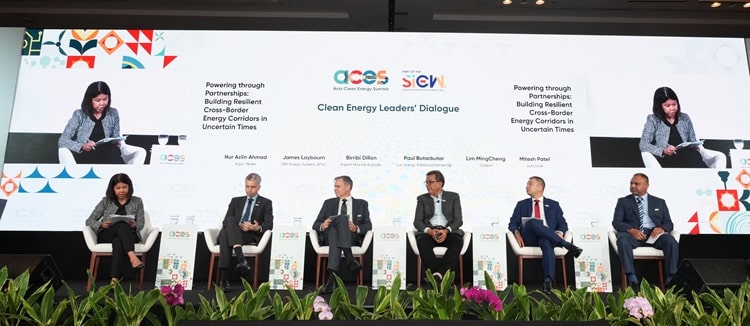SINGAPORE, October 28, 2025 — The 12th edition of the Asia Clean Energy Summit (ACES) opened today at Marina Bay Sands, setting the tone for three days of dialogue on how Asia can accelerate its clean energy transition through collaboration, innovation, and financial resilience.
Organised by the Sustainable Energy Association of Singapore (SEAS) as part of Singapore International Energy Week (SIEW) 2025, ACES 2025 gathers ministers, investors, and corporate leaders to chart the region’s path to net-zero under the theme “Rethinking Resilience and Readiness in a Disrupted World.”
Singapore Reaffirms Regional Commitment
In her opening remarks, Ms Gan Siow Huang, Minister of State for Foreign Affairs and Trade & Industry, reaffirmed Singapore’s commitment to strengthening regional energy cooperation and innovation.
She emphasised Singapore’s leadership role in advancing connectivity across ASEAN through three key channels — the ASEAN Power Grid, capability-building partnerships, and public-private collaboration.
“The ASEAN Power Grid would unlock our region’s wealth of renewable energy, catalyse new green jobs and investments, enhance energy access, and create resilience for the region,” said Ms Gan, adding that achieving a sustainable and inclusive energy future would require deeper cooperation in carbon markets, workforce development, and private sector partnerships.
Grid Projects Signal ASEAN’s Energy Integration Momentum
In his welcome address, SEAS Chairman Er. Edwin Khew said that while grid limitations, financing barriers, and regulatory uncertainty continue to slow progress, Southeast Asia is demonstrating encouraging signs of cross-border cooperation.
He cited two key regional projects as examples — the Riau–Singapore solar power connector, expected to transmit up to 4GWac (28GWp) of renewable energy by 2028, and the ASEAN Power Grid’s Laos–Thailand–Malaysia–Singapore (LTMS) interconnection, which was recently extended to 200MW.
“These collaborations show that the region is moving in the right direction,” Khew said. “But to sustain momentum, we must strengthen cross-border cooperation, communication, and financing to build resilience and accelerate progress.”
Khew also unveiled insights from SEAS’s latest State of the Energy Transition in ASEAN 2025 survey, which highlights regulatory uncertainty, grid constraints, and financing as the biggest challenges facing the region.
Despite these headwinds, respondents identified clearer policy frameworks, investment in clean infrastructure, and regional power-trade agreements as the top enablers for a clean energy future.
The survey findings reflect growing consensus that collaboration — rather than competition — will define ASEAN’s ability to meet its renewable energy targets.
Industry Launches: Powering Asia’s Energy Shift
ACES 2025 also saw major industry collaborations unveiled on the opening day. Equator Renewables Asia (ERA) signed a memorandum of understanding with Climate Resources Exchange International (CREI), part of China National Nuclear Corporation, to develop and export clean energy from Indonesia’s Riau Islands to Singapore — marking another milestone in ASEAN’s cross-border energy corridor.
In another launch, SEAS and SGTech jointly released a whitepaper titled “Powering a Greener Digital Future: Clean Energy Adoption in Data Centres,” calling for standardised power purchase agreements (PPAs) and greater public-private collaboration to decarbonise Singapore’s data infrastructure.
Frank Phuan, Vice Chairman of SEAS, noted that Singapore’s data-centre ecosystem “is only as sustainable as the energy that powers it,” highlighting SEAS members’ growing role in providing clean energy solutions.
The conference’s keynote address was delivered by Jay Joel L. Soriano, Vice President for Strategy and Planning at First Gen Corporation, who challenged the region to pursue “24/7 renewables” — integrating geothermal, hydro, solar, and flexible gas for round-the-clock clean power.
“Technology is advancing rapidly, but scaling impact requires policy alignment, financial innovation, and cross-border collaboration,” Soriano said. “This is how we move from ambition to action.”
New Tracks and Thematic Focus
For the first time, ACES 2025 will feature a Bioenergy Track, underscoring its potential to complement solar, hydrogen, and storage in building regional energy resilience.
Another highlight is the IRENA High-Level Forum on Financing the Energy Transition, co-hosted with Singapore’s Energy Market Authority (EMA), which will unveil the Accelerator Partnership for Renewable Energy in Southeast Asia (APRESA). The initiative aims to strengthen infrastructure, mobilise private finance, and accelerate the region’s goal of tripling renewable capacity by 2030.
Investment, Innovation, and the Path Ahead
The summit’s sessions over the next two days will explore financing innovation, scaling decarbonisation in Asia’s built environment, and fostering climate-tech entrepreneurship through iPitch @ ACES, a startup investor pitching event featuring firms such as Sun Metalon Inc., Hydgen, and RE24.
With over 100 exhibitors from China, Japan, Spain, the UK, and Singapore, ACES 2025 serves as a nexus of ideas and partnerships driving Asia’s clean energy future.
Closing his address, Er. Khew thanked Minister Gan, the Energy Market Authority, and regional partners including the Asian Development Bank, Infrastructure Asia, and Enterprise Singapore for their continued support.
“ACES continues to serve as a trusted platform for thought leadership, collaboration, and partnerships,” he said. “It’s where the region’s challenges and solutions come together to find sustainable opportunities for the future.”

